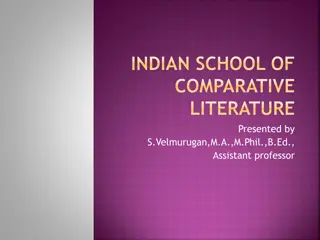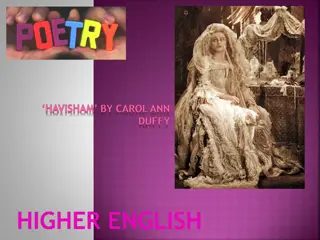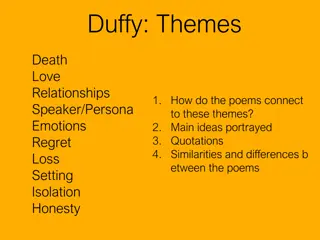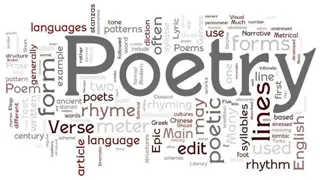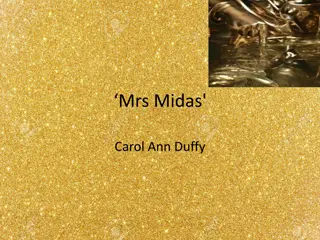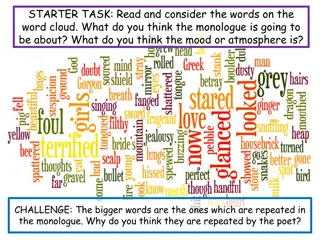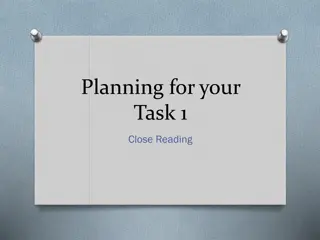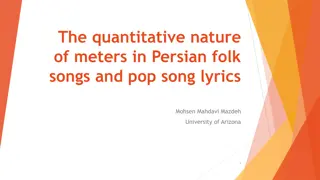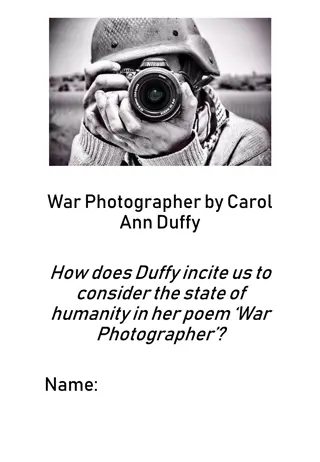Analyzing Emotions in Poetry: A Comparative Study of 'Hitcher' by Armitage and 'Stealing' by Duffy
Explore the presentation of emotions in 'Hitcher' by Armitage and 'Stealing' by Duffy through an in-depth analysis of poetic techniques, themes, and meanings. Compare how the poets convey emotions, delve into the structure, language, and imagery of each poem, and examine techniques such as caesura, enjambement, and rhyme to provide a comprehensive evaluation. Discover the unique characteristics of each poem and how they contribute to the exploration of emotions.
Uploaded on Nov 18, 2024 | 0 Views
Download Presentation

Please find below an Image/Link to download the presentation.
The content on the website is provided AS IS for your information and personal use only. It may not be sold, licensed, or shared on other websites without obtaining consent from the author. Download presentation by click this link. If you encounter any issues during the download, it is possible that the publisher has removed the file from their server.
E N D
Presentation Transcript
Stealing LO: Exploring the poet's techniques, themes and meaning
Essay Question Compare how the poets present emotions in 'Hitcher' by Armitage and 'Stealing' by Duffy.
Essay writing skills Opening paragraph: Write about what happens in each poem. Second paragraph: Focus on structure Third paragraph: Language and imagery Fourth paragraph: Any other ideas you want to explore Fifth paragraph: Compare and contrast Conclusion: Answer the question! Summarise how the poetic techniques are used to explore emotions. Use short integrated quotations Use your annotated poems and your notes Use the appropriate terminology
Techniques to look out for Highlight the examples of the following techniques on your copy of the poem. Write brief annotations explaining the effects the writer creates by using each technique. Caesura Enjambement End-stopped line Rhyme Internal rhyme (rhyme which occurs in the middle of a line rather than at the end) Pararhyme Alliteration
What happens? The poem is a conversation between a self-confessed thief and an unidentified questioner. The thief is responding to the question, 'What is the most unusual thing you ever stole?' We build up a picture of a disenchanted person who steals because they have nothing else to do and don't care about others.
Structure The poem consists of five equal stanzas of five lines each. Enjambement allows the lines to flow like natural speech. The rhythm is uneven: sentences are short and some words stand alone, 'Again. Again.' Imitating the effect of someone speaking spontaneously. There is no end-rhyme but there is occasional internal rhyme to link ideas, such as 'slice'/'ice'
Language Poem written in first person. Duffy has taken on the persona of the thief. We know little about the speaker's background and do not even know whether they are male or female. We gain an impression of the speaker through their language. Strong because she carried the snowman even though 'He weighed a ton' and is strong-minded too.
Language An accomplished thief, used to breaking into people's houses and apparently has never been caught. Ignores people's feelings. Enjoys knowing that her actions provoke a response. Enjoys leaving a mess. Selfish. Unconcerned about the effect the actions have on others. Acts out of boredom. Does not need the things that are stolen it just passes the time. Casual attitude towards theft suggested by the use of colloquial language and slang. Perhaps the most disturbing aspect is the reason why s/he chose to steal the snowman. S/he is lonely and feels his/her brain has iced over: there is no place for human warmth there now.
Language Many of the stolen items are associated with creativity, but the thief is unable to create. Cannot play the guitar she stole. Stole a bust of Shakespeare only to sell it on. Most bizarrely, a snowman was stolen rather than make his or her own. Then s/he ruined it. Seems that s/he only knows how to destroy. Alliteration links and emphasises the association of ideas. Enjambement suggests the pattern of natural speech but also has a dramatic role in the poem. 'I took a run/ and booted him' mimics how s/he planned a run up, paused, then kicked the snowman. The pause after 'might' in 'thought I might/learn to play' hints that it was never a real intention.
Imagery Metaphor, 'My breath ripped out/in rags' explains the physical effort of destroying the snowman. Rags are torn pieces of cloth; this image in a description of an act of destruction focuses on 'rags' that are themselves something destroyed. Snowman could be a symbol for the speaker. Snowman is seen as a 'mate', the speaker almost admitting that they feel closer to the snowman than to any real person. The snowman is lonely; the speaker leads a solitary life and is apparently friendless. The snowman is cold; the speaker has a 'slice of ice' in his/her brain and stands 'alone amongst lumps of snow'. The snowman is finally destroyed will the speaker's actions ultimately be self-destructive?
Ideas to consider The thief is honest, admitting what s/he has done and why, 'boredom'. Confident enough to speak directly to the interviewer We understand what she is saying on a literal basis, but we cannot understand why s/he feels so alienated from society and acts as she does. Should we sympathise with the speaker? Confident and boastful, 'sometimes I steal things I don't need'. Also vulnerable, 'sick of the world' S/he is unable or lacks the patience to succeed or gain pleasure in the ways most of us do, such as by making our own snowman or learning to play the guitar.
Hitcher - What happens? A man disaffected with his work and feeling bored, decides on the spur of the moment to do something different. He drives around aimlessly, picks up a hitchhiker in Leeds and then, apparently unprovoked, attacks the man with a steering wheel lock and pushes him out of the moving car. The narrator has no regrets about his actions.
Structure 5 regular stanzas of five lines each. First line is short (4-6 syllables), second line longer (7-11 syllables) and the next longer still (10-14). The fourth is shorter again and the fifth shorter still. Each stanza resembles an arrow on the page. What might this signify? Driver s feelings: Calm/controlled exhilarated/out of control then calm again.
Language First person Past tense as the narrator recounts his memories to someone, although there are no clues as to whom. (Policeman or psychiatrist or friend). We are left to speculate. It starts with what seems to be an excuse for the behaviour that follows and the knowledge that he was about to lose his job. No other explanation or remorse shown. The narrator includes precise information. Make of car, names of towns he passed through, the fact that he hit the hitcher six times . Narrator s precision contrasts with the vague attitude of the hitchhiker. The hitchhiker is in some ways similar to the narrator. The differences are more marked. Hitcher relaxed hippie with few possessions. Narrator is more materialistic. Hitcher poetic, Narrator uses slang. He borrows phrases from the weather forecast, which suggests he doesn t have the imagination to entertain independent thoughts or to empathise with his victim.
Ideas to consider Both men are hitchers We cannot be sure which man is the Hitcher of the title. Why does the narrator attack the hitchhiker? Not premeditated. Perhaps it is because the hitcher has the freedom he wishes he himself could have. Dark humour. Is Armitage commenting on meaningless violence in our society today.





